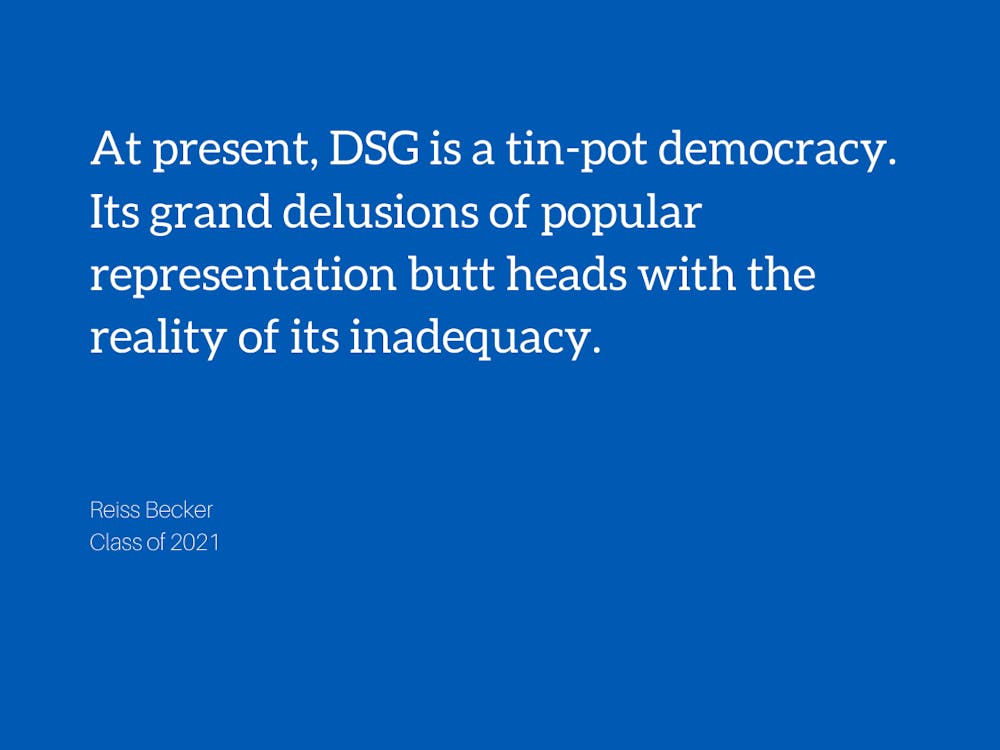Has our government failed us? It claims to uphold “the highest ideals of democratic representation,” yet cronyism abounds. It purports to “promote the welfare” of its citizens, but its legislative agenda consists of self-congratulatory vanity projects. If nothing else, this house has resolved to its own wondrous virtue. Our elected representatives’ failure to live up to their stated ambitions comes at a great cost: their own legitimacy. Constituents wonder “what… [their representatives] even do” and whether legislators simply seek some “fluff to add to their resumes.” Duke’s foremost deliberative body, Duke Student Government (DSG), faces a crisis of confidence.
Beyond anecdotes, DSG’s failure to galvanize students is revealed statistically. Despite extensive election coverage in the Chronicle, candidate flyers papering every possible public surface and the easy, breezy beauty of electronic voting, only around 33% of Duke undergraduates voted in the last three Presidential elections. For God’s sakes, more Duke students turned out to vote for the oh-so-inspirational congressman G.K Butterfield in 2018, pushing his vote count from nearly 70% to just under 70%. Duke students are apparently more interested in the uncompetitive, off-year congressional election of a septuagenarian than in the governance of their own community.
So what’s wrong? It's not the fundamentals, which are ideal. DSG governs a student body that is bright and informed. Its representatives are passionate, focused and forthcoming—yearly, a large crop of enthusiastic first years arises to replace the departed seniors. With an annual budget of almost $400,000, DSG’s coffers runneth over.
The problem is inherent to DSG’s electoral system. The DSG Senate consists of 60 members, 48 elected representatives, 12 per class year, and 12 selected At-Large Senators. The issue with electing Senators by class year is that doing so assumes the existence of a collective interest amongst students on that basis. For instance, what do all sophomores universally share? They are of a similar age group, they enrolled at the same time and they all have a few common undergraduate experiences. Besides these marginally significant facts, not much unites sophomores, or any given class of students, at Duke. No wonder Duke students are abstaining from Senate elections, DSG’s electoral system demands they express a collective interest that does not exist.
If not class year, then what does unite Duke students? Anyone familiar with our campus knows that Duke students are meaningfully bound together by their academic pursuits, their moral convictions, their particular, personal interests and their career aspirations. Conveniently, all of these categories, these ties that bind us, are physically manifested within our on-campus housing system.
The members of Illyria share far more and have a far clearer collective interest than any randomly selected group of juniors. The residents of Giles are far better acquainted with each other than they are with the residents of Blackwell dorm, despite the fact that both dorms are populated by first years. Therefore, rather than arbitrarily asking Duke students to vote for 12 Senators to represent their class year, DSG’s electoral system should be based on living groups and every living group should be represented by a single Senator in DSG Senate.
As of now, DSG Senate elections are distant, impersonal affairs. Generally speaking, most students do not know the candidates that are running to represent them and, therefore, do not much care who is elected. But what if the candidate running to represent you in DSG Senate lived just down the hall? What if your next Senator was going to be a sister in your sorority or a member of your SLG? In that case, surely, students would pay closer attention and be more likely to vote in DSG elections. Moreover, this change would improve the quality of DSG’s political representation, as electoral outcomes would be more finely attuned to voter preferences.
In a win for political accountability, elections would also cease to be the sole opportunity for voters to influence their representatives. Under this system, by virtue of proximity, constituents could easily access their Senators and lobby them on group priorities when necessary. If DSG Senators want to be reelected, they will take constituent feedback and, by extension, their seat in DSG seriously. This would diminish the perception that Senators run for DSG Senate just to have another “social engagement” or “leadership” activity to throw on the resume. In turn, confidence in the legitimacy and usefulness of DSG would increase because students would have a direct, personal connection to their representation.
Finally, DSG would also be greatly improved if At-Large Senators were abolished. Rather than being elected, At-Large Senators are “selected by an interview process conducted by the Selection Committee,” which is composed of members of DSG’s Executive Branch. Essentially, this is a group of Senators who reflect the interests of DSG’s executives rather than the will of the voters. Holding 20% of the seats in DSG Senate, At-Large Senators obfuscate DSG’s democratic purpose. They represent no one in the student body and such Senators are only “at large” in one sense: they have indefensibly evaded democracy. Seemingly the product of affirmative action for failed populists, At-Large Senators should not be permitted in an organization that claims to act “in accordance with the highest ideals of democratic representation.” DSG should either take itself seriously as a legitimate representative body or throw in the towel and admit it is just an institutionalized resume-filler. It is high time to decide.
At present, DSG is a tin-pot democracy. Its grand delusions of popular representation butt heads with the reality of its inadequacy. Yet with a touch of tinkering and a bit of change, Duke Student Government could become more democratic and more authentically representative. Let us reform.
Reiss Becker is a Trinity junior. His column, “roused rabble,” typically runs on alternate Wednesdays.
Get The Chronicle straight to your inbox
Signup for our weekly newsletter. Cancel at any time.

